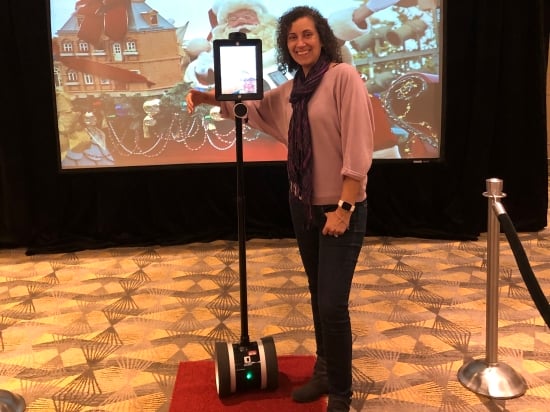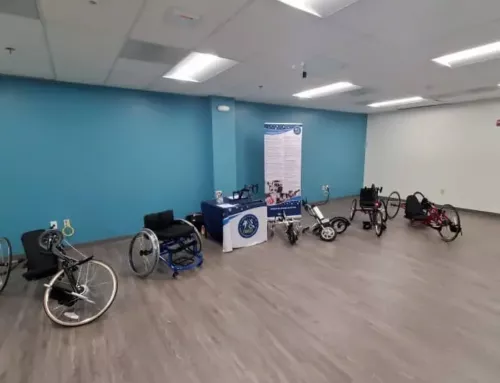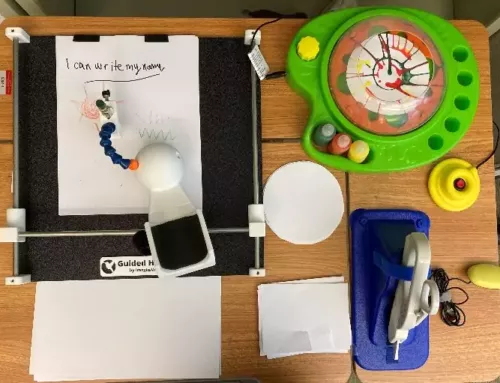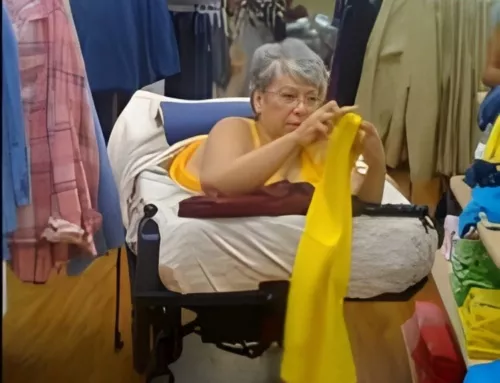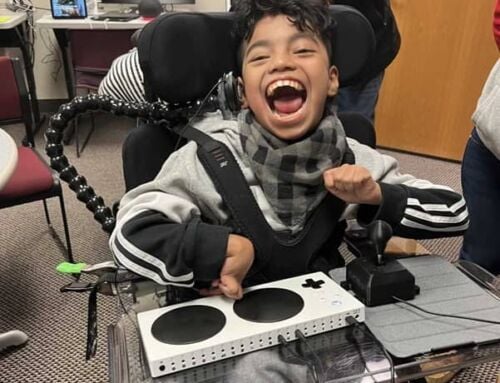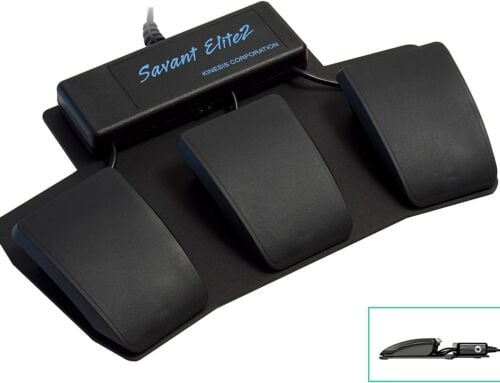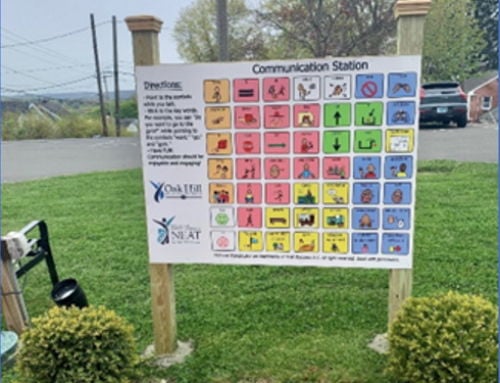Weight and Seating Independence Comes to Wheelchair Users in Massachusetts
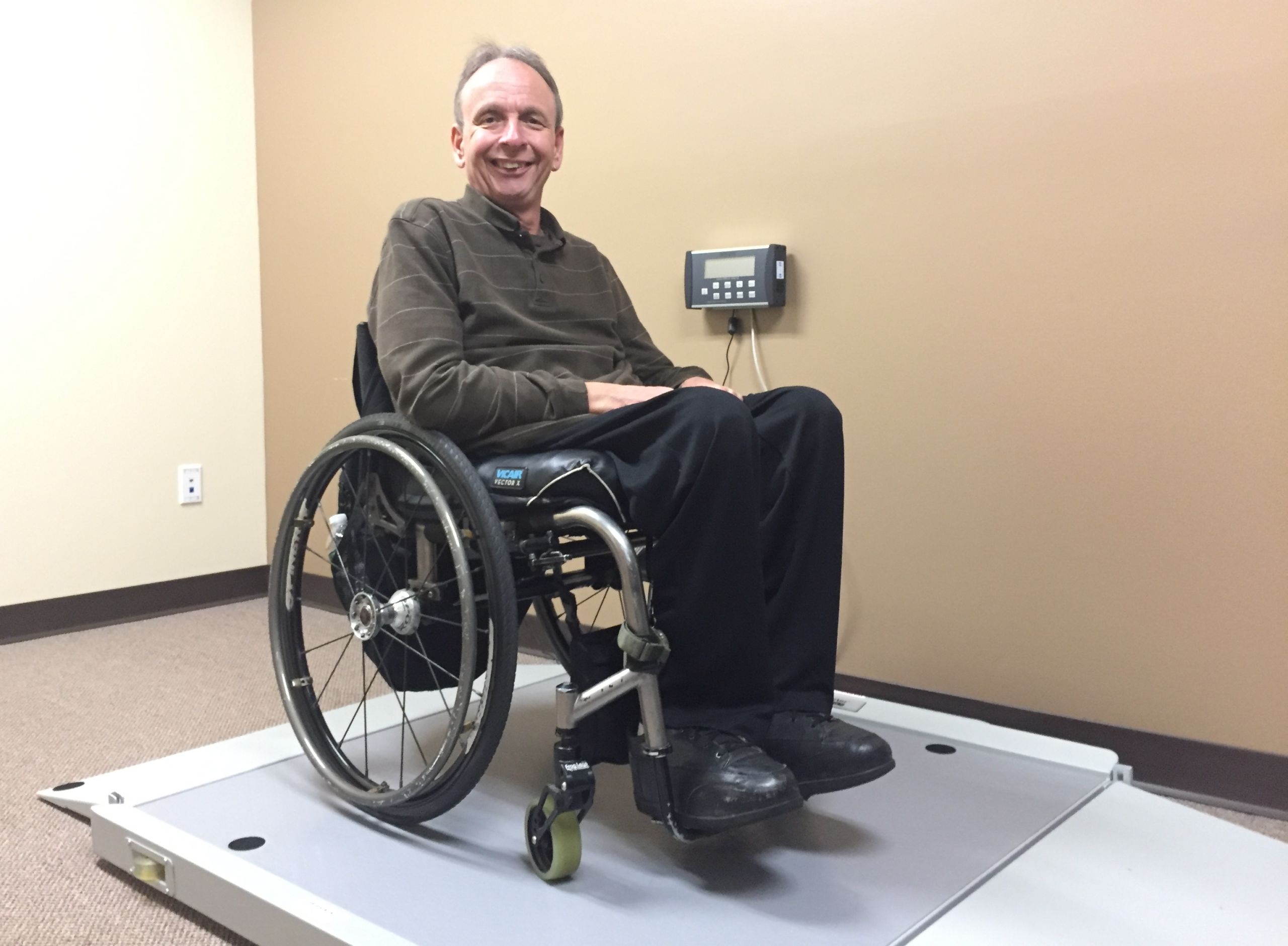
A unique MassMATCH project is making digital pressure mapping systems and specialized scales available to wheelchair users in their own communities.
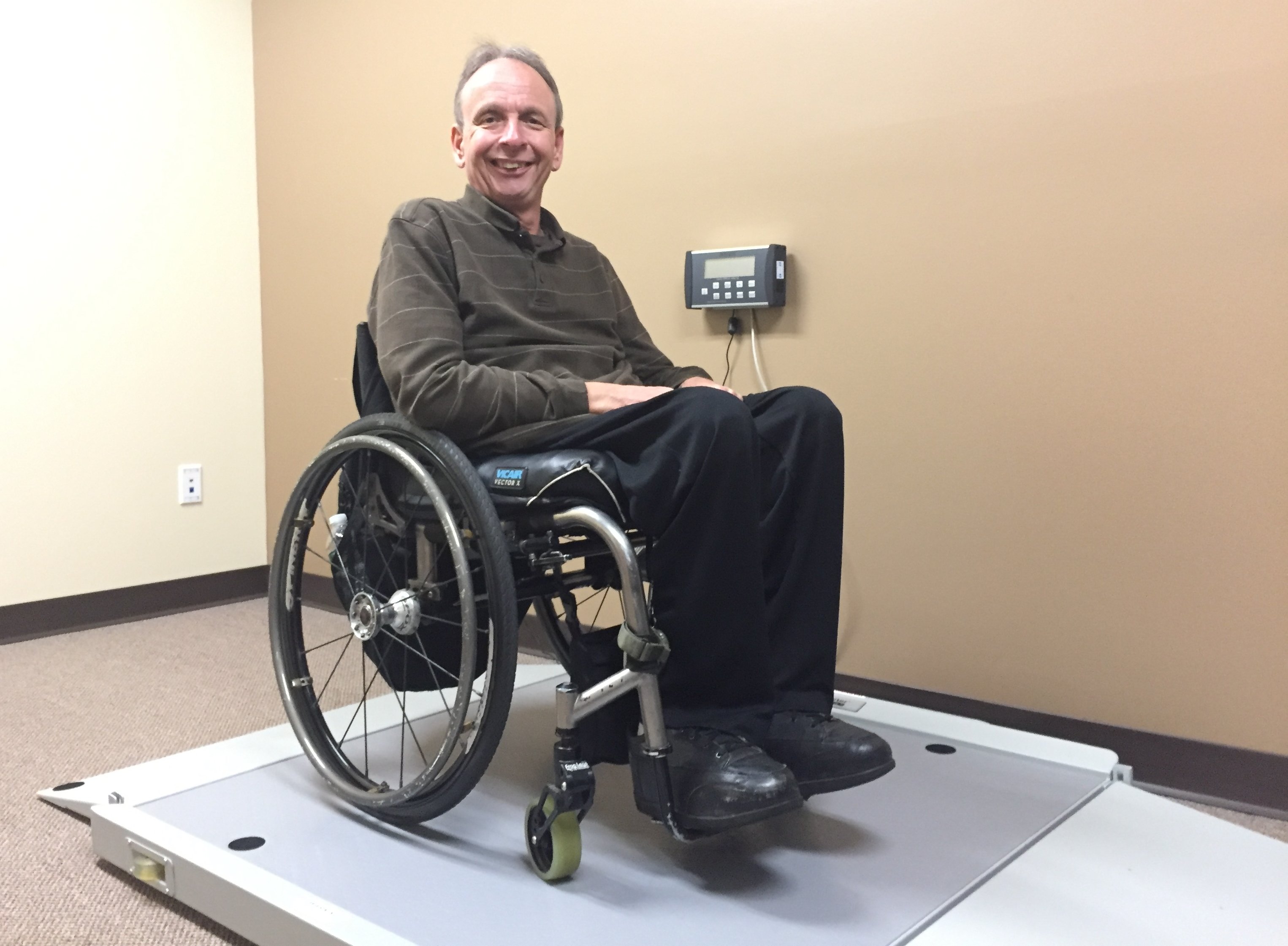
Mike Kennedy poses with the roll-on scale at the Center for Living and Working in Worcester, Massachusetts
“It’s been 25 years since the passage of the ADA and I still have nowhere to go to get weighed!” — a Worcester resident
In Worcester, Springfield and Pittsfield, focus group participants brought up their inability to get weighed at their doctors’ offices (or anywhere). Participants swapped stories of using UPS scales. In Pittsfield, one attendee with diabetes (who needed his weight for medication dosing) reported using the scale at the local scrap metal yard.
“So many times I get asked for my weight and I don’t have an answer.”— an SCI Community Survey respondent
A related alarming theme was a fear of recurring pressure injuries. Several participants explained they’d lost weeks of their lives to bed and long hospital stays because of pressure ulcers, yet rarely had they had access to the technology used to reveal “hot spots” caused by seating or positioning.
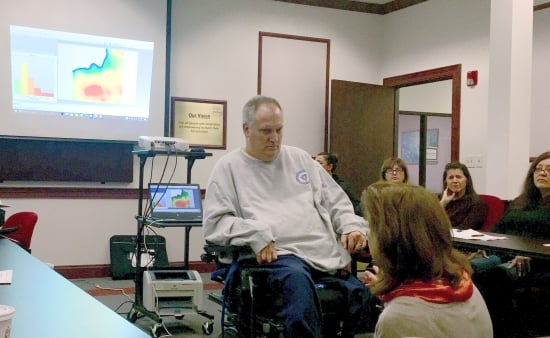
James Deignan receives advice from Mary Jo Wagner, OTL/R, ATP, during a pressure mapping training in Worcester. He is seated on a mat with sensors connected to a computer which is demonstrating areas of intense pressure beneath his sitting bones.
Regional Wellness Deserts for Persons with Paralysis
MassMATCH conducted follow-up research and confirmed central and western Massachusetts as regional wellness deserts for persons with paralysis. Access to pressure mapping in western Massachusetts often required a prescription from a wound clinic, and then weeks of waiting to get mapped by a wheelchair vendor (who used 10-year-old equipment). Getting weighed meant gaining entry to a rehabilitation facility to use the roll-on scale located in a too-public poolside location. MassMATCH surveyed United Spinal Association’s local support group members and found that 63% of respondents never get weighed or get weighed less than once each year. And 78% had either never used digital pressure mapping or had used it just once in their lives.
Yet experts report 60% of persons with SCI are likely to develop a pressure injury in their lifetime.
“Weight monitoring is an important component for prevention,” Bonney notes. “Wheelchair cushions are often adjusted by weight, and people with spinal cord injury have unique challenges with weight changes and corresponding health risks. The fear and frustration expressed in the focus groups made a great deal of sense.”
The Weight and Seating Independence Project (WSIP)
In response, MassMATCH launched the Weight and Seating Independence Project to provide access to specialized scales for wheelchair users and pressure mapping technology. The Reeve Foundation funded the project for 2017 to serve central and western Massachusetts. MassMATCH, with support from the Massachusetts Rehabilitation Commission, expanded the project statewide the following year.
“The goal is for people to gain control with the kind of information that most of us take for granted,” says Ann Shor, the Massachusetts Rehabilitation Commission (MRC’s) Director of Independent Living and Assistive Technology. “Everyone should be able to know their own body weight and no one should risk pressure injury because of inadequate seating or positioning with their equipment.”
MassMATCH acquired and placed portable scales and pressure mapping systems in its Assistive Technology Regional Centers. Every state and territory has an AT Program that loans assistive technology devices to individuals with disabilities, family members or professionals for up to 4 weeks at a time. The MassMATCH pressure mapping systems are available for borrowing at no charge. They are suitable for all ages and include a full mattress system for mapping the impact of sleeping positions and surfaces.
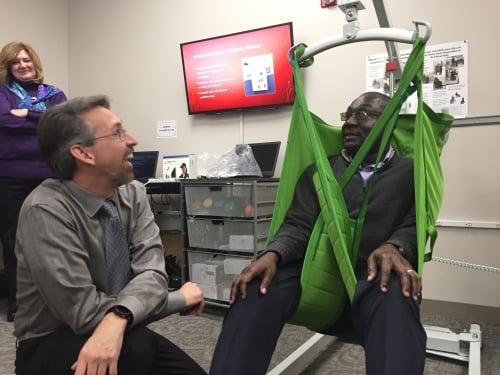
MassMATCH Coordinator Kobena Bonney tries out the portable sling lift with scale attachment with help from Eric Oddleifson at the AT Regional Center in Worcester.
The Least Restrictive Environment
The stories from focus group participants about restricted access influenced program design, Bonney says. “It’s obvious that wheelchair users need access to equipment in the least restrictive environment possible. So we decided to take an Independent Living approach to these services, one that emphasizes consumer control, consumer choice and the right to fail. Anyone may borrow these systems, including individuals with disabilities, family members and professionals.”
“My most recent use of the pressure mapping system showed that I had a problem with my bed. The mapping displayed some high-pressure points when I slept on my back. [….] It was the breakthrough I needed to stop the cycle of continuously trying to heal the wound. This would never have been resolved with just a seating evaluation at the hospital.” — a recent borrower in Pittsfield
To help ensure success, MassMATCH partnered with the Mass. Department of Developmental Services to offer four trainings in central and western Massachusetts with pressure mapping systems. Mary Jo Wagner, OTL/R, ATP, educated community members and clinicians on how to use pressure mapping and pressure injury prevention and consulted on the creation of a comprehensive user manual. The events raised awareness of pressure injury risk factors and fostered competency. They also readied AT Regional Center staff to provide ongoing device demonstrations to the public as requested.
Below James Deignan, who has a spinal cord injury, explains the revelation pressure mapping provided him during the training in Worcester.
https://youtu.be/qTvCj8X1lq4&w=550&h=385&rel=0
A Free Webinar on March 20th, 2019
This week, Mary Jo Wagner and Louise Colbourne, who directs the AT Regional Center in Pittsfield, are presenting “Getting Started with Pressure Mapping,” a free live webinar. The training will provide an overview of the causes of pressure injury, the basics of prevention, and the role of pressure mapping. The webinar will also explain how to borrow and use the equipment in Massachusetts.
Colbourne has taken the lead with loaning pressure mapping systems for MassMATCH and has 18 years in the field of Occupational Therapy. She is excited by some of the feedback she’s had from borrowers. “We have borrowers learning how to effectively achieve pressure relief which is essential for preventing and healing injuries. We have borrowers who are mapping multiple surfaces such as their car seats and mattresses. This is information they would not be able to get if these systems were only available at wound or seating clinics. It’s wonderful to be able to provide equipment that can empower people to take care of their own health and provide them some peace of mind.”
Learn more:
BodiTrak Pressure Mapping Systems
Skin Care and Pressure Sores from Model Systems Knowledge Translation Centers
Find Your State AT Program
Monthly Blog Digest
Search the blog
State AT Program Blogs
California
Florida
Indiana
Kentucky
Louisiana
Maryland
Massachusetts
Michigan
Montana
North Carolina
North Dakota
Utah
State AT Program Blogs
The AT3 Center, the Association of AT Act Programs (ATAP), and the Administration on Community Living (ACL) make no endorsement, representation, or warranty expressed or implied for any product, device, or information set forth in this blog. The AT3 Center, ATAP, and ACL have not examined, reviewed, or tested any product or device hereto referred.

